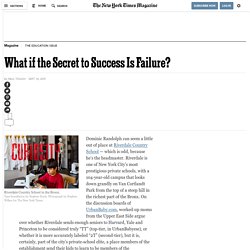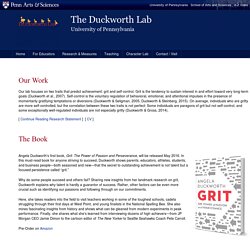Zoom
Trash

What if the Secret to Success Is Failure? Over the course of the next year and a half, Duckworth worked with Levin and Randolph to turn the list of seven strengths into a two-page evaluation, a questionnaire that could be completed by teachers or parents, or by students themselves.

For each strength, teachers suggested a variety of “indicators,” much like the questions Duckworth asked people to respond to on her grit questionnaire, and she road-tested several dozen of them at Riverdale and KIPP. She eventually settled on the 24 most statistically reliable ones, from “This student is eager to explore new things” (an indicator of curiosity) to “This student believes that effort will improve his or her future” (optimism).
For Levin, the next step was clear. 11 Signs You Have the Grit You Need to Succeed. There are a ton of qualities that can help you succeed, and the more carefully a quality has been studied, the more you know it's worth your time and energy.

Angela Lee Duckworth was teaching seventh grade when she noticed that the material wasn't too advanced for any of her students. They all had the ability to grasp the material if they put in the time and effort. Her highest performing students weren't those who had the most natural talent; they were the students who had that extra something that motivated them to work harder than everyone else. Angela grew fascinated by this "extra something" in her students and, since she had a fair amount of it herself, she quit her teaching job so that she could study the concept while obtaining a graduate degree in psychology at UPenn. Her study, which is ongoing, has already yielded some interesting findings.
Don’t Grade Schools on Grit. Still, separating character into specific strengths doesn’t go far enough.

As a teacher, I had a habit of entreating students to “use some self-control, please!” Such abstract exhortations rarely worked. My students didn’t know what, specifically, I wanted them to do. In designing what we called a Character Growth Card — a simple questionnaire that generates numeric scores for character strengths in a given marking period — Mr. Ceciliabergentz. Vad har hänt med elevens inre driv? Youtube. Grit = SISU = Uthållighet = Framgång - Kvartssamtal.se.
The Duckworth Lab. Our Work Our lab focuses on two traits that predict achievement: grit and self-control.

Grit is the tendency to sustain interest in and effort toward very long-term goals (Duckworth et al., 2007). Self-control is the voluntary regulation of behavioral, emotional, and attentional impulses in the presence of momentarily gratifying temptations or diversions (Duckworth & Seligman, 2005; Duckworth & Steinberg, 2015). TEDxBlue - Angela Lee Duckworth, Ph.D - 10/18/09. Seth Andrew, Founder of Democracy Prep Charter School.
True Grit. “The only thing that I see that is distinctly different about me is I’m not afraid to die on a treadmill.

I will not be outworked, period. You might have more talent than me, you might be smarter than me, you might be sexier than me, you might be all of those things — you got it on me in nine categories. But if we get on the treadmill together, there’s two things: You’re getting off first, or I’m going to die. It’s really that simple…” -Oscar-nominated actor and Grammy award-winning musician Will Smith The metaphor of achievement as a race recalls Aesop’s fable of the tortoise and the hare. Educational Leadership:Resilience and Learning:Grit Plus Talent Equals Student Success. Angela Lee Duckworth: The key to success? Grit. The Future of Self-Improvement, Part I: Grit Is More Important Than Talent. In the late ’60s, Stanford psychologist Walter Mischel performed a now-iconic experiment called the Marshmallow Test, which analyzed the ability of four year olds to exhibit “delayed gratification.”

Here’s what happened: Each child was brought into the room and sat down at a table with a delicious treat on it (maybe a marshmallow, maybe a donut). The scientists told the children that they could have a treat now, or, if they waited 15 minutes, they could have two treats. All of the children wanted to wait. (Who doesn’t want more treats?) But many couldn’t. Grit and the Secret of Success. Which Traits Predict Success? (The Importance of Grit)
What are the causes of success?

At first glance, the answer is easy: success is about talent. It’s about being able to do something – hit a baseball, play chess, trade stocks, write a blog – better than most anyone else. That’s a fine answer, but it immediately invites another question: What is talent? How did that person get so good at hitting a baseball or trading stocks? For a long time, talent seemed to be about inheritance, about the blessed set of genes that gave rise to some particular skill. Grit.